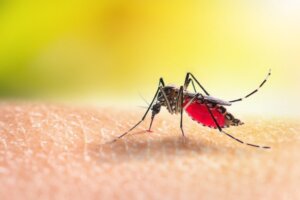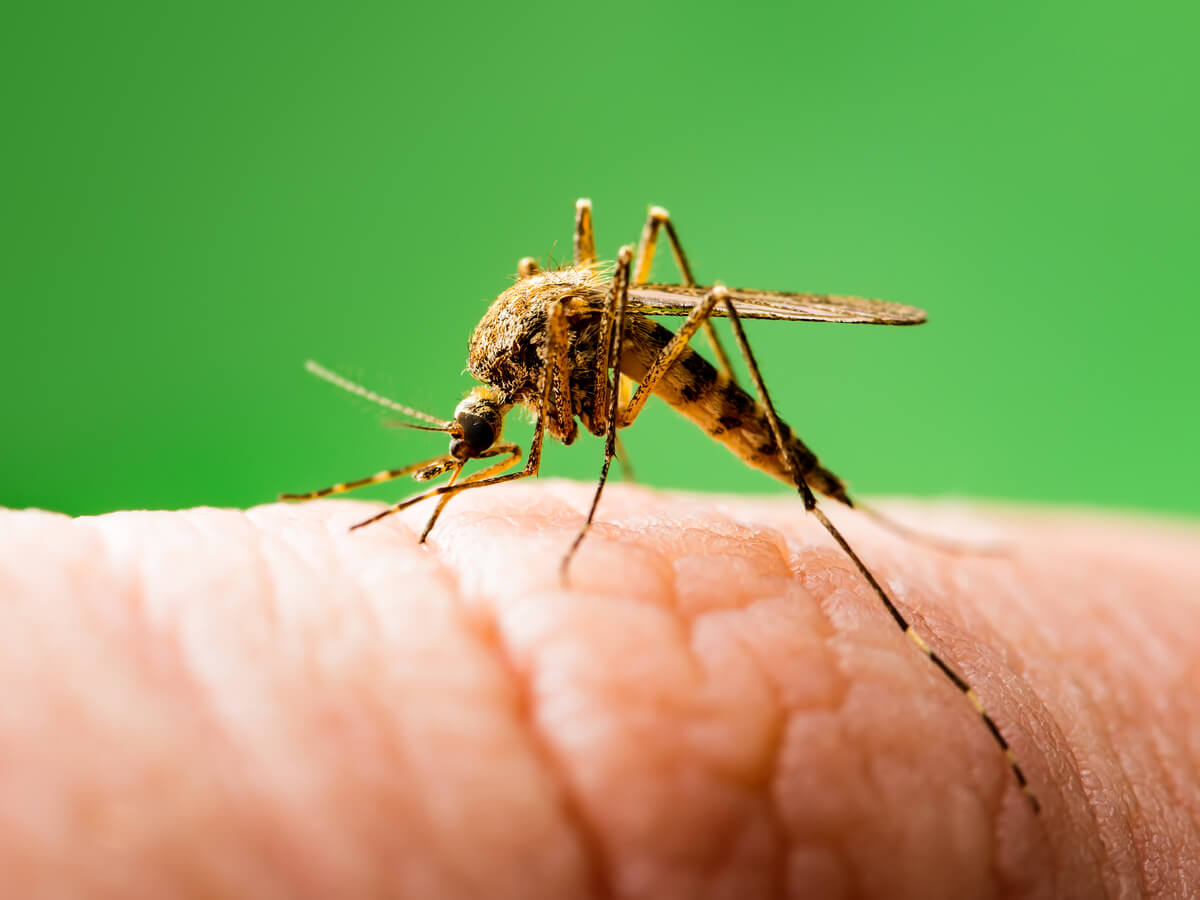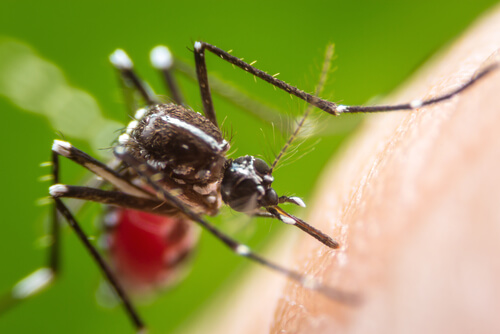What Is the Most Annoying Animal in the World?


Written and verified by biochemistry Luz Eduviges Thomas-Romero
For many people, choosing the most annoying animal is easy: it’s that unwanted guest that ruins a picnic in the park as well as a good night’s sleep. (In fact, as your editor writes this he can hear one buzzing around him and is scratching a bite on his leg!). It is, of course, the mosquito, which, in addition to its bites and the itching that accompanies them, can put us at risk of dangerous transmissible diseases.
The reasons that drive the habits of the most annoying animal in the world
Before we go any further, just to point out that it is scientifically correct to call a mosquito an “animal” (despite it clearly being an insect). This is because it belongs to the Animalia kingdom.
It’s surprising to learn that, according to scientists who study the biology and ecology of mosquitoes, entomologists, there are 3,590 named species of mosquitoes. But, we shouldn’t despair too much! There are “only” about 200 species that bite or bother humans.

Paradise on earth without mosquitoes doesn’t exist
The Culicidae family proliferates preferably in warm, humid climates at low altitudes above sea level. The presence of mosquitoes has obviously been recognized by all the inhabitants of the Earth, and in every language there’s a term, more or less specific, to designate them. There are records that include their presence in Antarctica and even desert areas.
The Seychelles archipelago in Africa is famous for being a place where there are no mosquitoes. The truth is that there are mosquitoes, a total of 20 species reported. However, there are no anopheles, the dreaded malaria vector. For this reason, you will be safe from getting sick there, but not from the desperate buzzing.
The most annoying animal in the world is successful because it needs little
Mosquitoes in their larval stage thrive in any stagnant body of water for at least a week. The larvae inhabit both wild niches such as swamps, puddles, riverbanks, and urban niches such as flower vases, cisterns, and all kinds of outdoor containers. Neither do they need a large amount of water; a puddle of just 1 centimeter deep (less than half an inch) will be enough.
The mosquito bites you out of necessity
First, it’s important to remember that only one group of mosquito species seek to ingest blood, the vast majority spend their lives perfectly well on nectar. It’s interesting to realize that in the hematophagous species, only the female mosquito bites. They collect about three milligrams of blood per bite.
In this way, females of the Aedes, Anopheles and Culex genera, among others, feed on human blood to obtain the amino acid isoleucine. This is essential for the development of their eggs and also increases the mosquito’s fecundity i.e. their ability to lay eggs.
It’s not your imagination, the mosquito really chooses to bite you
When choosing a victim, mosquitoes take into account a large number of factors that vary from person to person. These include skin temperature, the presence of water vapor, and the color of clothing.
Scientists believe that the most influential variables in this choice are chemical compounds produced by colonies of microbes living on the skin. Thus, bacteria convert sweat into volatile compounds – more than 300 – which are captured by the mosquito’s antennae.
Why is the most annoying animal in the world also the most lethal?
Mosquitoes, due to the characteristics of their own life cycle, have been exploited by disease-causing organisms, such as parasites and viruses. In this way, they have become vectors of diseases such as malaria, West Nile virus, Zika virus and others such as yellow fever, dengue or chikungunya.
These diseases together cause some 725,000 deaths each year. The worst is malaria, which alone kills more than 600,000 people each year. Malaria threatens half the world’s population and causes billions of dollars in lost productivity annually. Eliminating these diseases would save millions of lives and also eliminate much suffering and disability.
Is it possible to eradicate mosquitoes?

According to experts, mosquitoes play important roles in numerous ecosystems. They have been known to inhabit the Earth for more than 100 million years. In this time they have evolved along with many other species.
For this reason, eliminating a mosquito species could leave a predator without prey, or a plant without a pollinator. However, there are current efforts to combat some mosquito species, the most pernicious and disease-carrying ones.
However, in many cases, scientists tell us that the void left by a missing mosquito will be quickly resolved as other species fill the niche. For now, the elimination of Anopheles would be very important for humanity.
For many people, choosing the most annoying animal is easy: it’s that unwanted guest that ruins a picnic in the park as well as a good night’s sleep. (In fact, as your editor writes this he can hear one buzzing around him and is scratching a bite on his leg!). It is, of course, the mosquito, which, in addition to its bites and the itching that accompanies them, can put us at risk of dangerous transmissible diseases.
The reasons that drive the habits of the most annoying animal in the world
Before we go any further, just to point out that it is scientifically correct to call a mosquito an “animal” (despite it clearly being an insect). This is because it belongs to the Animalia kingdom.
It’s surprising to learn that, according to scientists who study the biology and ecology of mosquitoes, entomologists, there are 3,590 named species of mosquitoes. But, we shouldn’t despair too much! There are “only” about 200 species that bite or bother humans.

Paradise on earth without mosquitoes doesn’t exist
The Culicidae family proliferates preferably in warm, humid climates at low altitudes above sea level. The presence of mosquitoes has obviously been recognized by all the inhabitants of the Earth, and in every language there’s a term, more or less specific, to designate them. There are records that include their presence in Antarctica and even desert areas.
The Seychelles archipelago in Africa is famous for being a place where there are no mosquitoes. The truth is that there are mosquitoes, a total of 20 species reported. However, there are no anopheles, the dreaded malaria vector. For this reason, you will be safe from getting sick there, but not from the desperate buzzing.
The most annoying animal in the world is successful because it needs little
Mosquitoes in their larval stage thrive in any stagnant body of water for at least a week. The larvae inhabit both wild niches such as swamps, puddles, riverbanks, and urban niches such as flower vases, cisterns, and all kinds of outdoor containers. Neither do they need a large amount of water; a puddle of just 1 centimeter deep (less than half an inch) will be enough.
The mosquito bites you out of necessity
First, it’s important to remember that only one group of mosquito species seek to ingest blood, the vast majority spend their lives perfectly well on nectar. It’s interesting to realize that in the hematophagous species, only the female mosquito bites. They collect about three milligrams of blood per bite.
In this way, females of the Aedes, Anopheles and Culex genera, among others, feed on human blood to obtain the amino acid isoleucine. This is essential for the development of their eggs and also increases the mosquito’s fecundity i.e. their ability to lay eggs.
It’s not your imagination, the mosquito really chooses to bite you
When choosing a victim, mosquitoes take into account a large number of factors that vary from person to person. These include skin temperature, the presence of water vapor, and the color of clothing.
Scientists believe that the most influential variables in this choice are chemical compounds produced by colonies of microbes living on the skin. Thus, bacteria convert sweat into volatile compounds – more than 300 – which are captured by the mosquito’s antennae.
Why is the most annoying animal in the world also the most lethal?
Mosquitoes, due to the characteristics of their own life cycle, have been exploited by disease-causing organisms, such as parasites and viruses. In this way, they have become vectors of diseases such as malaria, West Nile virus, Zika virus and others such as yellow fever, dengue or chikungunya.
These diseases together cause some 725,000 deaths each year. The worst is malaria, which alone kills more than 600,000 people each year. Malaria threatens half the world’s population and causes billions of dollars in lost productivity annually. Eliminating these diseases would save millions of lives and also eliminate much suffering and disability.
Is it possible to eradicate mosquitoes?

According to experts, mosquitoes play important roles in numerous ecosystems. They have been known to inhabit the Earth for more than 100 million years. In this time they have evolved along with many other species.
For this reason, eliminating a mosquito species could leave a predator without prey, or a plant without a pollinator. However, there are current efforts to combat some mosquito species, the most pernicious and disease-carrying ones.
However, in many cases, scientists tell us that the void left by a missing mosquito will be quickly resolved as other species fill the niche. For now, the elimination of Anopheles would be very important for humanity.
All cited sources were thoroughly reviewed by our team to ensure their quality, reliability, currency, and validity. The bibliography of this article was considered reliable and of academic or scientific accuracy.
- Teets, N. M., Peyton, J. T., Colinet, H., Renault, D., Kelley, J. L., Kawarasaki, Y., … & Denlinger, D. L. (2012). Gene expression changes governing extreme dehydration tolerance in an Antarctic insect. Proceedings of the National Academy of Sciences, 109(50), 20744-20749.
- Le Goff, G., Boussès, P., Julienne, S., Brengues, C., Rahola, N., Rocamora, G., & Robert, V. (2012). The mosquitoes (Diptera: Culidae) of Seychelles: taxonomy, ecology, vectorial importance, and identification keys. Parasites & vectors, 5(1), 207.
- Fang, J. (2010). Ecology: a world without mosquitoes. Nature News, 466(7305), 432-434. https://img.fireden.net/tg/image/1480/79/1480796079879.pdf
- Rueda, L. M. (2007). Global diversity of mosquitoes (Insecta: Diptera: Culicidae) in freshwater. In Freshwater animal diversity assessment (pp. 477-487). Springer, Dordrecht. http://citeseerx.ist.psu.edu/viewdoc/download?doi=10.1.1.554.9727&rep=rep1&type=pdf
- Verhulst, N. O., Qiu, Y. T., Beijleveld, H., Maliepaard, C., Knights, D., Schulz, S., … & Mumm, R. (2011). Composition of human skin microbiota affects attractiveness to malaria mosquitoes. PloS one, 6(12).
This text is provided for informational purposes only and does not replace consultation with a professional. If in doubt, consult your specialist.








